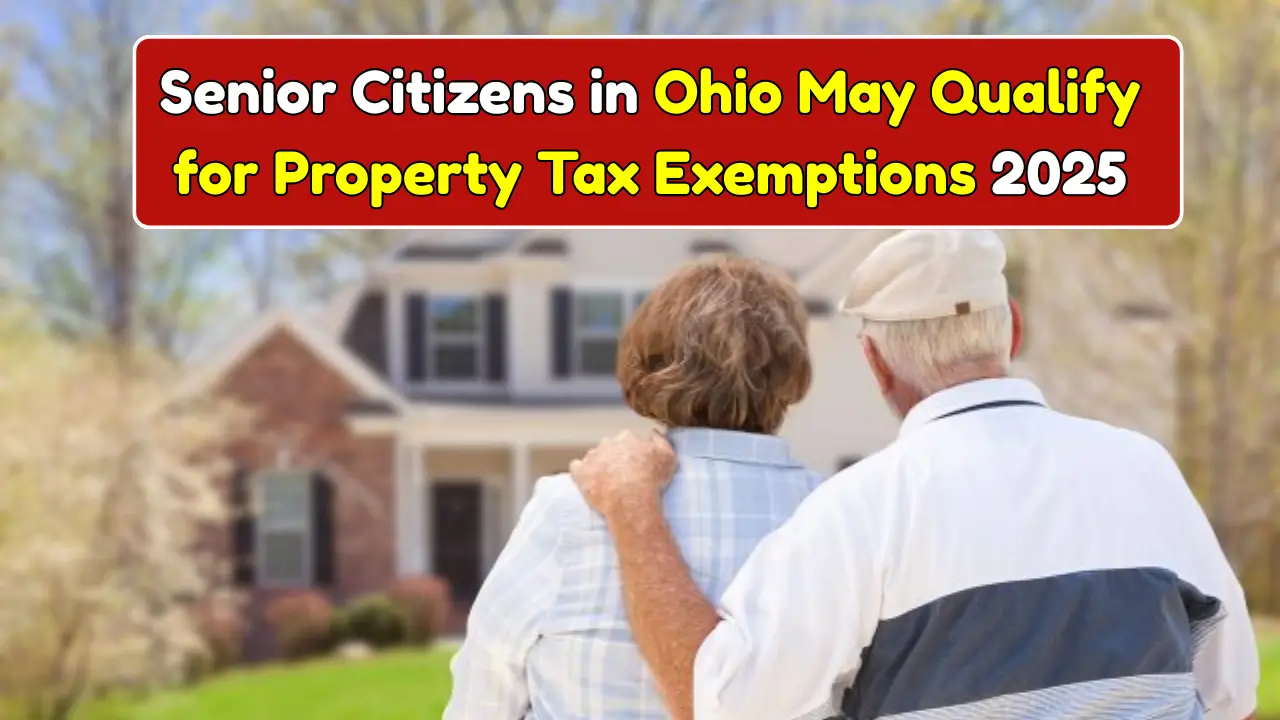Ohio, United States: Senior citizens in Ohio face increasing property tax burdens as real estate values rise across the state. Recognizing the challenges for older adults on fixed incomes, Ohio offers several tax relief exemptions.
These Homestead Exemptions reduce taxable property values for eligible seniors, lowering annual tax bills and helping seniors remain in their homes comfortably. Interested Ohio seniors need to understand the county-specific rules, eligibility criteria, and application process.
This article provides an informative county-wise overview of property tax exemptions available for seniors in Ohio in 2025.
Understanding Ohio’s Homestead Exemption Program for Seniors
The Ohio Homestead Exemption program is designed to shield part of a home’s market value from property taxes for seniors, disabled persons, and surviving spouses.
Established under state law, the exemption reduces the taxable value of a senior’s primary residence by a specified dollar amount — effectively reducing the property tax owed.
As of 2025, qualified seniors can exempt approximately $26,200 of their home’s value from local property taxes, though this amount is periodically adjusted annually for inflation.
For instance, for a home assessed at $100,000, the homeowner will be taxed as if the property’s value is $73,800 after applying the exemption.
Basic Eligibility Criteria for Senior Property Tax Exemptions in Ohio
While details can vary somewhat by county, the general eligibility requirements across Ohio include:
- The homeowner or resident must be at least 65 years old (age determined by December 31 of the tax year).
- The home must be the principal place of residence as of January 1 of the application year.
- The applicant’s total household income (adjusted gross income plus certain business incomes from state tax returns) must generally be below $40,000 for 2025, though some counties have more restrictive ceilings.
- Homeowners must file the Homestead Exemption Application (Form DTE 105A) annually or upon changes in ownership or eligibility.
- Certificates or proof of disability are required for disabled persons applying under that category.
- The exemption covers one parcel of land—typically a single-family home and up to one acre of surrounding land.
County-Wise List of Senior Property Tax Exemptions in Ohio
The program is administered by county auditors, and while the Ohio Legislature sets minimum standards for income and exemption amounts, counties have some discretion within state guidelines.
| County | Minimum Age | Income Limit (2025) | Exemption Amount (approx.) | Key Notes |
| Franklin | 65 | $40,000 | $28,000 (market value) | Additional benefits for veterans |
| Lucas | 65 | $40,000 | $26,200 | Applications deadline Dec 31 |
| Summit | 65 | $40,000 | $28,000 | Disabled veterans receive higher exemption |
| Greene | 65 | $38,600 | $26,200 | Renewal required annually |
| Fulton | 65 | $38,600 | $28,000 | Income based on Ohio MAGI |
| Hamilton | 65 | $40,000 | $26,200 | Limited to one home per applicant |
| Cuyahoga | 65 | $40,000 | $26,200 | Includes mobile homes |
| Delaware | 65 | $40,000 | $25,000 | Income documentation required |
| Montgomery | 65 | $40,000 | $26,200 | Disability exemptions separate |
| Warren | 65 | $38,600 | $28,000 | Applications accepted online |
Application Process for the Homestead Exemption
Applicants must file the Homestead Exemption Application (Form DTE 105A) with their local county auditor’s office each year, or upon initial eligibility.
For disabled applicants, a Certificate of Disability Form (DTE 105E) signed by a licensed physician is required, or alternatively, proof of Social Security disability benefits.
- The application deadline is typically December 31st of the year for which the exemption applies.
- Existing recipients will usually receive renewal forms by mail and must return them unless no eligibility changes occur.
- New applicants must submit proof of age, ownership, residency, and income documentation.
- The exemption is “portable,” meaning seniors who move within Ohio can apply to transfer the exemption to their new property.
Why Do These Exemptions Matter?
Property tax exemptions help seniors stay in their homes by reducing annual tax bills, making housing more affordable on fixed retirement incomes.
Ohio’s rapidly increasing property values and consequential tax hikes have placed financial pressure on older homeowners, making these exemptions critical for:
- Preventing displacement due to unaffordable property taxes.
- Supporting the independence and stability of seniors.
- Providing financial relief without reducing essential services funded by property taxes.
Table: Impact of Homestead Exemption on Typical Ohio Senior Tax Bills
| Home Market Value | Tax Rate (per $1,000) | Tax Bill Without Exemption | Tax Bill With $26,200 Exemption | Savings Per Year |
| $100,000 | $30 | $3,000 | $2,214 | $786 |
| $150,000 | $30 | $4,500 | $3,714 | $786 |
| $200,000 | $30 | $6,000 | $5,214 | $786 |
Savings vary with property values and local tax rates, but are substantial and recurring.
Recent Legislative Updates and Future Developments
There is active legislative discussion in Ohio to expand or modify property tax relief for seniors. Proposed bills aiming to increase exemption amounts or include tax freezes for qualifying seniors are under review to combat rising tax burdens further.
Senior advocacy groups continue to press for updates reflecting inflation and greater income flexibility.
Frequently Asked Questions (FAQs)
1. Who qualifies for the senior property tax exemption in Ohio?
Ohio residents aged 65 or older with a household income generally below $40,000, owning and living in their primary residence, may qualify.
2. How much exemption can seniors receive?
Exemptions typically reduce the taxable value of a home by about $26,200, lowering the property tax due.
3. How do I apply for the exemption?
File form DTE 105A with your county auditor’s office by December 31, along with income and age verification.
4. What if I move to a new home in Ohio?
You can apply to transfer your exemption to your new property during the same tax year.
5. Are disabled seniors eligible for additional exemptions?
Yes, permanently and totally disabled homeowners may qualify for additional or separate exemptions with proper certification.






